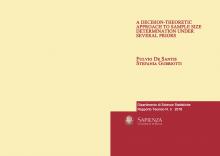Autore:
F. De Santis, S. Gubbiotti
Abstract:
In this article we consider sample size determination (SSD) for experiments in which estimation and design are performed by multiple parties.
This problem has relevant applications in contexts involving adversarial decision makers, such as control theory, marketing and drug testing.
Specifically, we adopt a decision-theoretic perspective and we assume that a decision on an unknown parameter of a statistical model involves two actors, ${{\cal{E}}_e}$ and ${{\cal{E}}_o}$, who share the same data and loss function but not the same prior beliefs on the parameter. We also suppose that ${{\cal{E}}_e}$ has to use ${{\cal{E}}_o}$'s optimal action and we finally assume that the experiment is planned by a third party, ${{\cal{P}}_d}$.
In this framework we aim at determining an appropriate sample size so that the posterior expected loss incurred by ${{\cal{E}}_e}$ in taking the optimal action of ${{\cal{E}}_o}$ is sufficiently small.
We develop general results for the one-parameter exponential family under quadratic loss and analyze the interactive impact of the prior beliefs of the three different parties on the resulting sample sizes. Relationships with other SSD criteria are explored.
Parole Chiave:
Bayesian inference, Experimental design, Exponential family, Predictive analysis, Sample size determination, Statistical decision theory
Tipo di pubblicazione:
Rapporto Tecnico
Codice Pubblicazione:
3
Allegato Pubblicazione:
Contatto:
ISSN:
2279-798X


